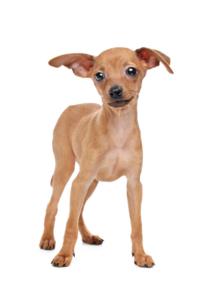How to Train a Miniature Pinscher?
1. When training your Miniature Pinscher, giving praise and favorable reinforcement is extremely beneficial and important Miniature Pinscher young puppy.
2. In no situations, ought to you shout at your pup or punish them for not listening — positive reinforcement is the best method to train your Miniature Pinscher.
3. When it comes to applauding your Miniature Pinscher, instead of patting them on top of their head or back, provide a pat under their chin or chest as it is more affectionate for them.
4. Training your Miniature Pinscher shouldn’t be done in long sessions. It is more efficient to train them with frequent however brief sessions throughout the day. It’s suggested to train a Miniature Pinscher 3-5 times a day for 5-minute sessions. This ensures you are getting their complete attention.
5. When your pup has effectively done what you asked to, reward them with a dog treat.
6. A big mistake that a lot of Miniature Pinscher owners make is letting their young puppy do things at a young age that they would not want them to do in the future (e.g. laying on furniture). Don’t let them get into this routine otherwise it will be exceptionally hard to change your dog’s behaviour in the future.
7. Puppy training for a Miniature Pinscher need to begin at 8 weeks old and they generally run at full learning capability in between 8-12 weeks.
8. Your intonation is your biggest training aid – when praising utilize a happy tone, and a firm tone when stating “No” (but make certain you’re not shouting).
How to Potty Train a Miniature Pinscher puppy?
Among the first things you will need to do when bringing home a new Miniature Pinscher, is potty training them. It will spend some time and will be hard however with our guide on how to potty train a Miniature Pinscher young puppy, you will get there sooner than later on.
1. Take your Miniature Pinscher pup out frequently: To start, take your Miniature Pinscher outside every hour that you can and wait there with them for a few minutes to see if they require to go. This will limit the chances of them going to the toilet inside and teach them where they need to be doing it. When they do properly go to the toilet outside, make certain you praise them or even give them treats. Over time, they will know they need to go to the toilet outside. As they are getting better, extend the amount of time in between going outside.
2. Discover the indications your Miniature Pinscher has to go: Common indications that Miniature Pinschers and all canines reveal when requiring to go the toilet consist of: sniffing the floor, squatting, circling, barking, and waiting at the door that leads outside.
3. Take your Miniature Pinscher to the same area every time: It’s crucial that you always attempt to take your Miniature Pinscher When taking them to go to the toilet, puppy to the exact same area through the very same exit. This will teach them to just go in the same area and will make cleaning up after them a lot easier for you. The exit must be someplace quickly noticeable so you know when they are heading towards there or waiting there that they need to go to the toilet.
How to Train a Miniature Pinscher Not to Bite?
The Center for Disease Control mentions that canines bite approximately 4.5 million people per year. This high number might seem a bit distressing, but our guide on how to train a Miniature Pinscher not to bite will help guarantee your Miniature Pinscher does not contribute to this.
1. Mingle your Miniature Pinscher at a young age: The best thing you can do for your Miniature Pinscher is presenting them to a great deal of new individuals, places, and scenarios as you can. A well-socialized Miniature Pinscher puppy is much less most likely to be distressed in new circumstances, and will then be less likely to be aggressive.
2. Neuter your Miniature Pinscher: There is some proof that states that neutered dogs tend to be less aggressive and less likely to bite.
3. Take part in obedience training: An obedient Miniature Pinscher is a lot much easier to control. If you can control your pet’s habits, it is less most likely to be aggressive and bite.
4. Be aware of your Miniature Pinschers body movement: It is commonly known that a Miniature Pinscher who is scared of having their territory got into has the potential to be aggressive and bite. Behaviors like raised heckles, bared teeth, and a decreased head are all indications that a Miniature Pinscher is uneasy. Attempt to comfort them and eliminate them from this circumstance when its safe if you notice your Miniature Pinscher canine showing this type of body language.
How to Train a Miniature Pinscher to Stop Barking?
Getting your Miniature Pinscher to stop barking takes consistency, time, and practice. It does not happen over night however our pointers on how to train a Miniature Pinscher to stop barking will be very valuable.
1. Do not yell back: Screaming will just get your Miniature Pinscher to bark much more since they believe you are participating in. Speak strongly and calmy, but do not shout.
2. Teach your Miniature Pinscher to understand the word “Quiet”: Whenever your Miniature Pinscher is barking, state “Quiet” in a stong and calm voice. Wait on them to stop barking and when they do praise them with a treat.
3. An exhausted Miniature Pinscher is a peaceful Miniature Pinscher: If your Miniature Pinscher barks a lot on their own, take them out for more regular exercise or play. They are less likely to bark when tired.










